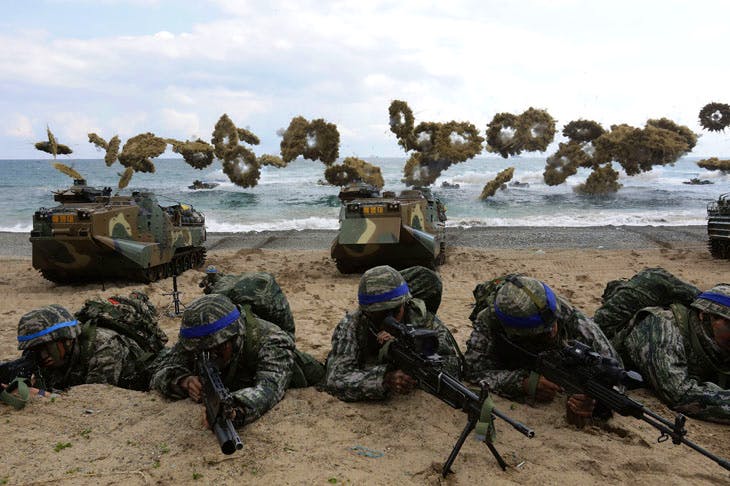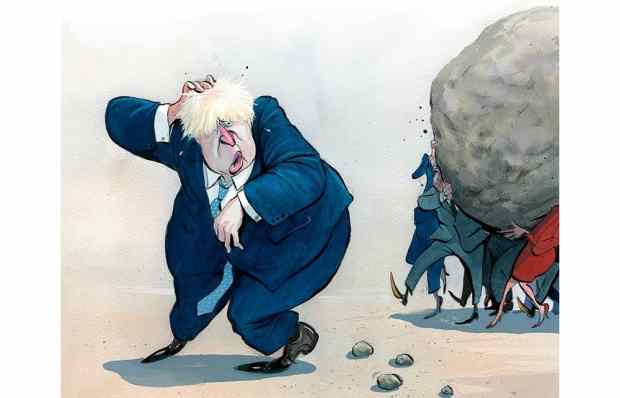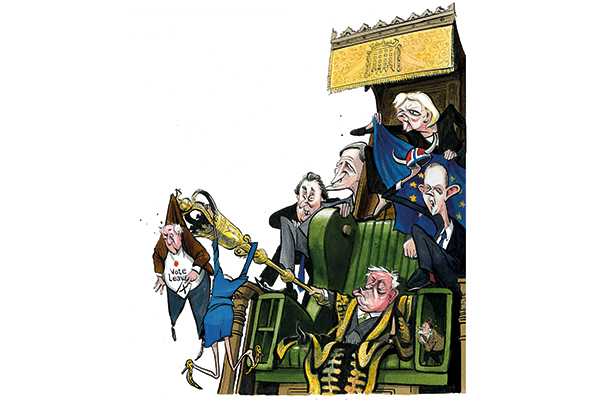On several foreign policy issues, Donald Trump has mellowed since taking office. His administration still has concerns about the Iran nuclear deal, but it is backing away from the idea of simply ripping it up or unilaterally rewriting it. On the European Union, he is calming down too; his White House no longer says Brexit marks the beginning of the end of the European project. But on North Korea his positioning is hardening. Hence his warning that ‘if China is not going to solve North Korea, we will’. Not only does Trump want this problem fixed, but his National Security Council is already working on plans to do so.
Washington has been trying to work out what to do about North Korea for 20-odd years. Before September 11, the question of how to handle Pyongyang was the big foreign policy split in the Bush administration — Colin Powell wanted to continue the Clinton regime’s diplomatic approach and Dick Cheney favoured a more hawkish policy. But the focus on the Islamic world that followed pushed North Korea down the agenda. The Bush years were followed by Obama and an altogether more cautious — overly cautious — approach to world affairs.
Andrew J. Bacevich, General Sir Richard Barrons and Heather Williams discuss Trump’s wars:
The result is that North Korea is what the West has always tried to prevent, a rogue state that almost certainly has a nuclear arsenal. At the end of the Obama administration, its Director of National Intelligence James Clapper declared that ‘the notion of getting the North Koreans to denuclearise is probably a lost cause’. What makes North Korea having nuclear weapons so worrying is that it is hard to say with any certainty that Kim Jong-un is a rational actor. What makes it so urgent is that Pyongyang may soon be capable of miniaturising a warhead and placing it on an intercontinental ballistic missile. This would raise the prospect of North Korea being able to threaten the US mainland; an unacceptable state of affairs for any US president.
North Korea is an unpredictable state with far less to lose than any previous nuclear power and it could even attempt nuclear blackmail: give us billions of dollars or Los Angeles gets it.
The Trump administration is working on a two-stage approach to dealing with North Korea. First, they are clear that they regard Russia and China as patrons of the regime there. So their first step will be to challenge both Moscow and Beijing to join the effort to deal with this problem.
I understand that the message to Russia will be that if it wants to be welcomed back to the global top table, it needs to help with the North Korea issue. ‘There’ll be no Trump-Putin handshake until that happens,’ one insider tells me.
To Beijing, Trump will say that if China wants to be more than a big economic power then it must step up and sort out this problem on its doorstep. There will be a link made between trade and this question. The more China does to reduce the threat from Pyongyang, the less inclined Trump will be to slap punitive tariffs on its goods.
There is no guarantee that either of these approaches will work. China has more influence on North Korea than Russia does. But it doesn’t want to put too much pressure on Pyongyang because it fears the regime’s collapse. First, it doesn’t fancy dealing with the migrant crisis if millions of North Koreans take the opportunity to flee north across the border into China. Second, it worries that the collapse of the current regime would ultimately lead to a united democratic Korea to its south. This would shift the regional balance of power in a way that Beijing sees as inimical to its interests.
So if getting Russia and China to help doesn’t work, then what? Well, I understand that Trump’s Secretary of State Rex Tillerson was not bluffing when, speaking of military strikes, he said: ‘That option is on the table.’ Inside the Trump White House, they think that there can be a viable military solution to the North Korean problem. They are convinced that it is possible to take out the infrastructure behind Pyongyang’s nuclear weapons programme. In particular, they calculate that they can successfully target the regime’s ability to give these weapons greater range as well as destroy the weapons themselves.
This approach might succeed, but it would do so at immense cost — much of the Korean peninsular could end up as collateral damage. Because however successful a US strike might be, there can be no certainty that it would deliver regime change. North Korea would almost certainly try to respond with a military attack against South Korea. If it still had the capability, Pyongyang’s response might well include a nuclear element. It is a sign of how concerned the US is about a North Korea with a long-range nuclear arsenal that despite this, the military option remains open.
In truth, there are no good options for dealing with North Korea — the whole situation is a reminder of why rogue states should not be allowed to acquire nuclear capabilities. But there is a chance China can resolve the problem. If it turned off the food and energy supplies that its neighbour relies on, Pyongyang might come to the negotiating table in a more accommodating state of mind. Indeed, if Beijing is not prepared to do this, secondary sanctions — punishing Chinese firms that trade with North Korea — could have some of the same effect.
The current North Korean situation is a serious failure of US policy, and it came into being before Trump became president. Trump, with his rash and impulsive approach to problems, is hardly a reassuring person to be taking decisions that could lead to a nuclear conflict. But you don’t have to be a Trumpian to see why the United States government regards a rogue state having the ability to threaten the US homeland with nuclear missiles as unacceptable.
If China wants to prevent a war in its backyard, it should take Trump’s warnings on North Korea seriously and bring Kim Jong-un to heel.
Got something to add? Join the discussion and comment below.
Get 10 issues for just $10
Subscribe to The Spectator Australia today for the next 10 magazine issues, plus full online access, for just $10.
You might disagree with half of it, but you’ll enjoy reading all of it. Try your first month for free, then just $2 a week for the remainder of your first year.















Comments
Don't miss out
Join the conversation with other Spectator Australia readers. Subscribe to leave a comment.
SUBSCRIBEAlready a subscriber? Log in